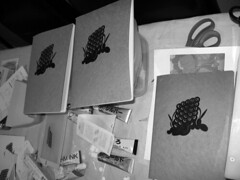Before I get into the meat of this post, I wanted to mention that the schedule for the Beyond Pedagogy group has been revised – our last meeting was canceled at the 11th hour and will be rescheduled at our next meeting on May 8th. The full schedule is found here.
Now then, having recently finished the current reading selection, Inventing Kindergarten, I felt compelled to add to the list of imaginary classes that should be instituted down the line: Kindergarten 101.
What is Kindergarten?
Though Friedrich Froebel’s original vision of kindergarten has become terribly diluted, the original vision was of “a radical and highly spiritual system of abstract-design activities intended to teach the recognition and appreciation of natural harmony” (page 12). Frankly, the spirituality aspect of Froebel’s kindergarten isn’t to be taken lightly, the entire curricula was designed around a sense of discovered unity throughout life.
Aside from spirituality, the goals of curriculum were about student play and abstraction. Through a serious of activities and “gifts,” students are urged to slowly move from explicit and real representations to abstract and varied methods of understanding, visualizing, and imagining. The process is entirely unlike the kinds of practices enforced in high schools today.
And while kindergarten kept kids busy every day (the class itself being rigorously structured), the entire process was to feel natural and fun: “Kindergarten was play, and a good kindergartener made certain her little sprouts never thought otherwise – the theoretical underpinnings of the education were kept from children just as they are in any classroom situation” (page 145). Not sure, I’d agree with the last clause – I’ve used Freire as a means to open discussion and dialogue in my class and candidly discuss motivations behind my practice. However, there are certain things that remain behind the curtain, as I’ll explain about the Black Cloud.
I realize this is a painfully limited description (go read the book!), I mainly want to outline the key goals of kindergarten: unity, natural harmony, abstraction, and play. As Brosterman explains, “The intended result of this all-encompassing instruction was the creation of a sensitive, inquisitive child with an uninhibited curiosity and genuine respect for nature, family, and society…” (page 39).
So What Went Wrong?
I mentioned that kindergarten ain’t as it used to be. The main reason for this – surprise – is crass consumerism. The “gifts” that are essential to the kindergarten experience became marketed so aggressively that production flaws would change or “enhance” the tools used in the class: “the gifts have been transformed, the educational objective for what is left of the occupations has been lost of corrupted” (page 40). Similarly, the teachers that continued the tradition of Froebel’s kindergarten didn’t have the kind of subtle and detailed training that was required. A certain amount of finesse was required for the differentiated and nuanced work that took place every day in the class.
Funnily enough, consumerism is part of what’s ruining education today as well! Public schools are being forced to “comply” with specific curriculum as is often created by private companies and organizations. There are ferocious bidding wars by groups like Prentice Hall and Holt to be the “official” textbook within a school. Millions of dollars are at stake. The material? About as good as a one-size-fits-all solution can be. At a recent professional development meeting, the presenter mentioned that most questions within English textbooks rarely invoke the higher order thinking skills in Bloom’s taxonomy. (Synthesize??? What’s that?!)
But Why in High School?
Today, students come into my class at the beginning of the year wary, uninterested, and expecting to do the work to pass the class. The curiosity factor is nil. The occasional expressive and interested student is seen as a thrilling anomaly and is quickly fetishized by a handful of teachers. Most are not the “sensitive, inquisitive” children of Froebel’s dreams. And if that sounds like a slight to the students I teach, it’s not: the things that my students write, create, or express continually amaze me throughout my class. However, somewhere along the line, students were programmed to stop asking questions, stop having fun, and start learning how to bubble in the “right” answers on by-rote exams on a semi-annual basis. Yes, schools really do kill creativity.
Students need to feel comfortable playing; this is part of the process of learning and being creative. We need a system for students to get back into the habit of having fun.
What Would This Look Like in High School?
A lot of this is about changing what happens inside the classroom. Why can’t there be a sense of mystery in an English class? Why can’t your history class be inquiry based and allow room for “play”?
What most excites me about the Black Cloud game is the opportunity to completely throw students off balance. Not only will students be playing a game for a month and a half in my class, but – for most of the time – they won’t even know they are playing a game. The entire project relies on student curiosity. Yes, we’re still learning the necessary English skills I’m required to teach, but we’re doing it in a way that Froebel would probably admire. (And just like in Kindergarten, the actual learning and “goals” of the unit remain hidden. The premise of play and discovery are all that is visible for the students).
Kindergarten is a pedagogical tool that can be adapted for all ages. It’s classroom interaction, student and teacher roles within the classroom, and school activities re-envisioned. It was invented more than 150 years ago and it just might be the most refreshing way to transform the current educational landscape.
EDIT: No, I don’t know why I wrote “Post-secondary” when I was talking about high school… it’s fixed now. It’s monday and it’s already been a long week…
Tell people this is awesome:




